Yakisoba chicken is a beloved Japanese stir-fry that’s sure to satisfy your taste buds.
Yakisoba means “fried noodle” in Japanese. To me, it means heaven on earth.
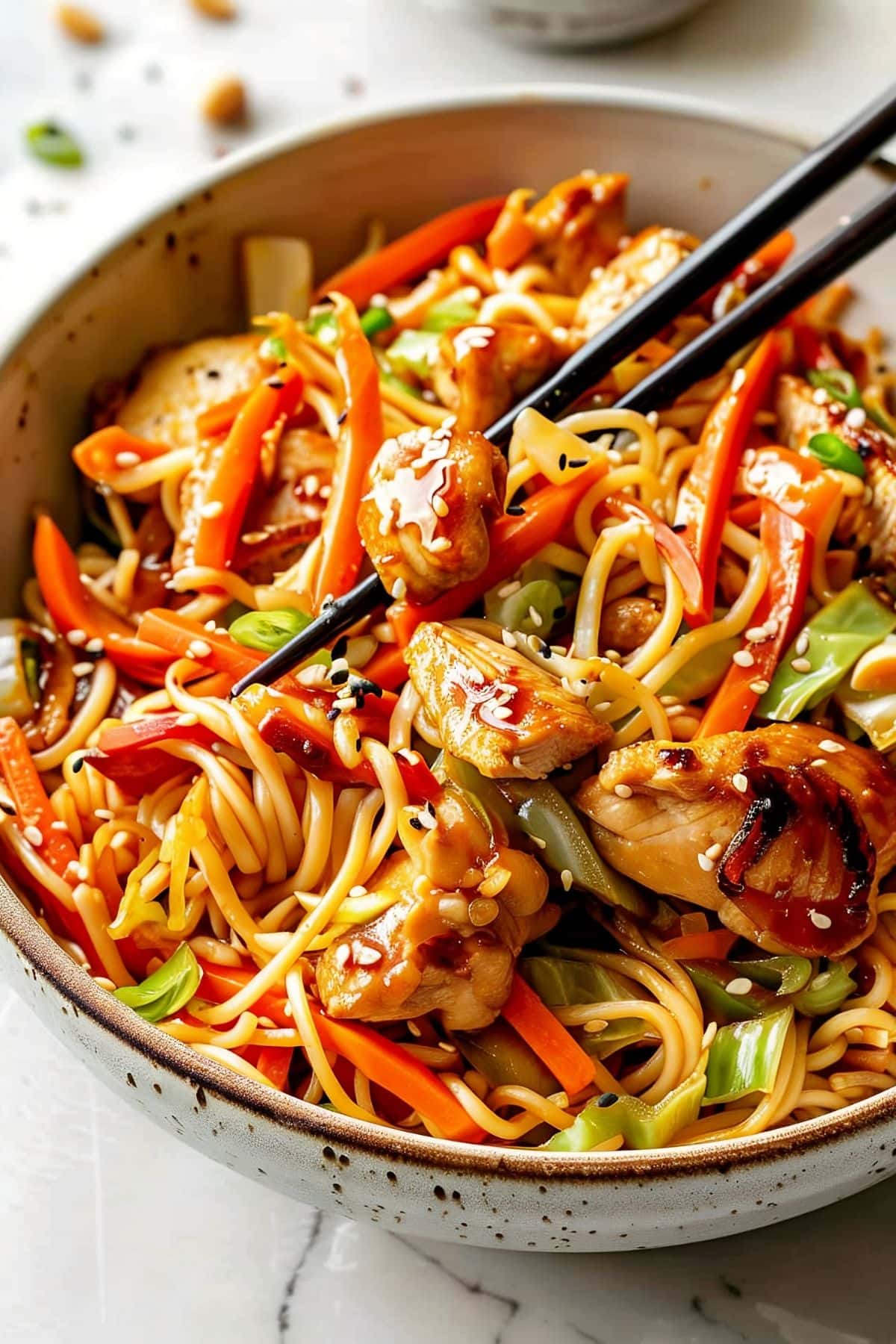
Thick noodles, tender chicken, and crunchy vegetables are coated in a sweet and savory sauce.
When it comes to stir-fries, yakisoba is one of my favorites.
Sure, it has quite a few ingredients, but don’t let that deter you! It’s surprisingly easy to make!
Craving Japanese cuisine? Scratch that itch with this simple yet stunning Yakisoba chicken.
Yakisoba Chicken
Yakisoba is a traditional Japanese stir-fry that features chuka soba in a thick sauce.
The noodles are mixed with a variety of colorful veggies and meat for more oomph.
Authentic yakisoba requires many hard-to-find ingredients. In this recipe, things are simplified by using accessible ingredients you can find in most grocery stores.
It may not be totally authentic, but it’s pretty darn close.
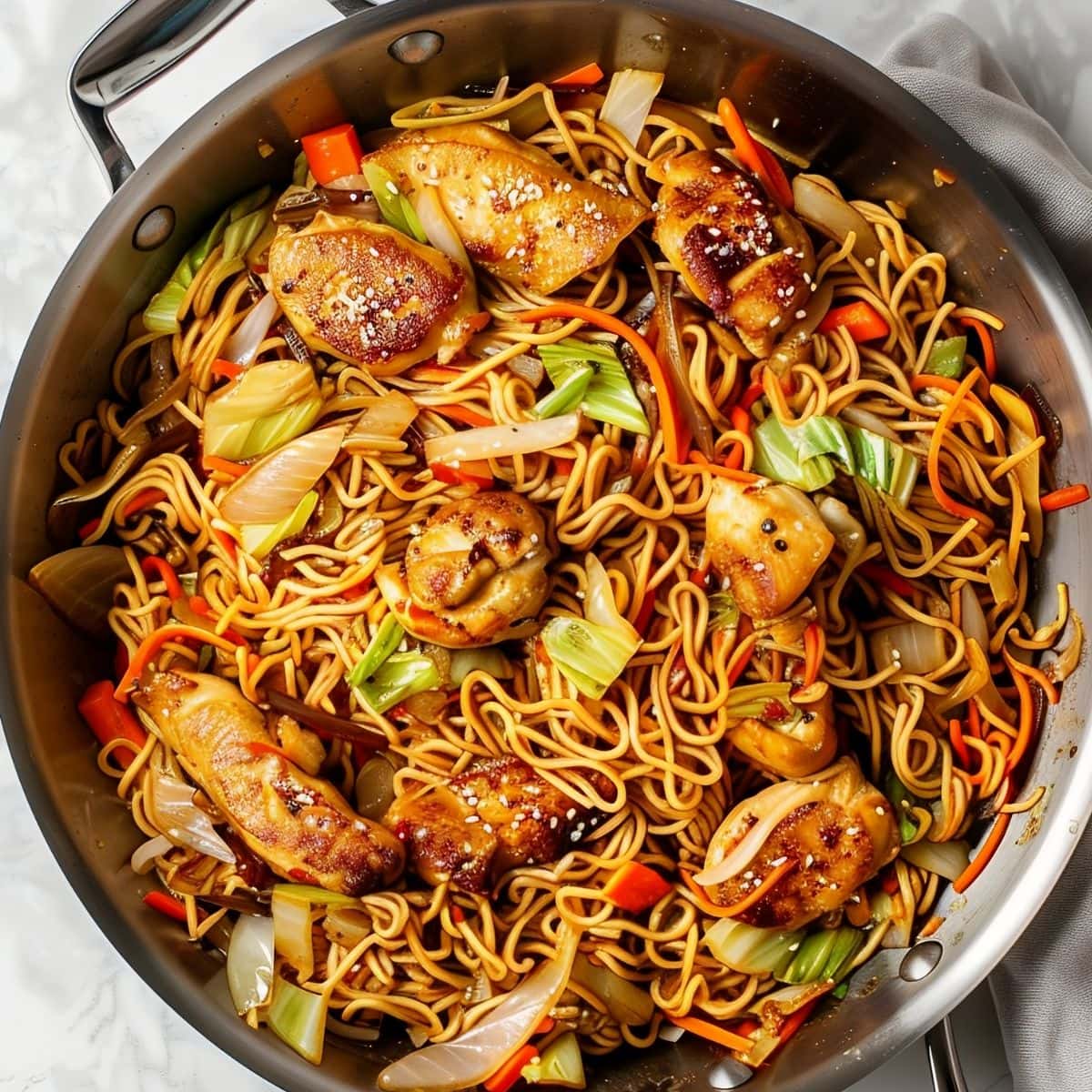
Ingredients
- Sesame Oil. This fragrant oil with a mild nutty flavor is perfect for stir-fries.
- Canola Oil. For stir-frying the vegetables. Stick to either vegetable or canola for a neutral flavor. Olive oil is a no-no, as it has a strong flavor and a low smoking point.
- Chili Paste. To spice things up.
- Garlic and Onion. For that heavenly aroma and strong, pungent flavor that will liven up the dish.
- Chicken Breast. The main protein of the dish. You can also use tenders or thighs for juicier meat.
- Soy Sauce. For saltiness. Use a good quality brand, such as Kikkoman.
- Cabbage. For crunch and color. You can use both green and purple cabbage for a lovely contrast.
- Carrots. Also for crunch and color. Slice the carrots into thin matchsticks for a shorter cooking time.
- Soba Noodles. The star of the dish! Lots of tips about soba for you below.
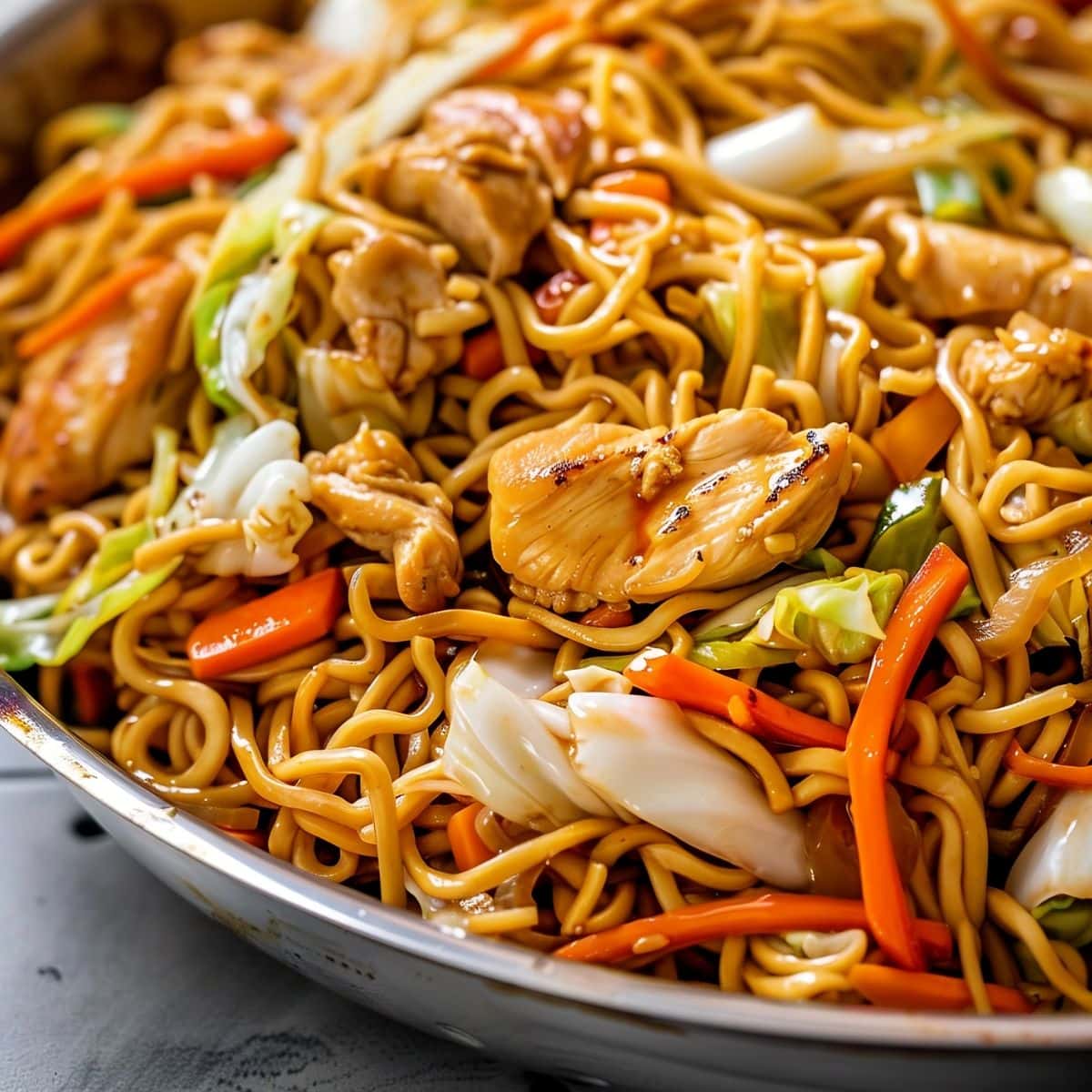
Tips for the Best Yakisoba Chicken
- This recipe serves a pretty great-tasting yakisoba chicken, but feel free to customize it to suit your taste and diet. Here are some ingredients you can add to your stir-fry to switch things up:
- Veggies: mushrooms, baby corn, bean sprouts, red and green bell peppers, green beans, bamboo shoots, zucchini, bok choy (Chinese cabbage), snow peas, purple cabbage, celery, broccoli, asparagus, spinach
- Meats: chicken tenders, turkey, pork, beef, squid, shrimp
- Sauces: Kikkoman soy sauce, Worcestershire sauce, teriyaki sauce, tonkatsu sauce, oyster sauce, ketchup
- Spices: cayenne powder, red chili flakes, Sriracha sauce, scallions, grated ginger
- For sweetness: brown sugar, hoisin sauce
- For crunch: peanuts, water chestnuts, sesame seeds
- Do not overcook the vegetables. No one wants lumpy, soggy veggies! You may even want to undercook them a bit for extra crunch.
- Save time with a bag of pre-cut veggies. You can also use a bag of pre-shredded coleslaw mix in place of cabbage and carrots. I love fresh, but sometimes you just need to get a meal on the table quickly!
- Can’t find soba noodles? Lo mein and ramen (fresh or dried) work, too. You can even use spaghetti, in a pinch.
- Rinse the soba noodles thoroughly. Otherwise, they’ll be too sticky. Run the noodles under cold water until the water runs clear.
- Do not overcook the noodles. Soba noodles are already pre-steamed, so you’ll just need to cook them in hot water very briefly to soften them. Just a minute, maybe even less, will do. Otherwise, they become too soggy.
- If you have extra time, velvet the chicken breast. It’s a proven Chinese method that produces extra tender chicken. You’ll marinate the chicken for no more than 30 minutes in a mixture of:
- 1 tablespoon cornstarch
- 1 tablespoon soy sauce
- 1 tablespoon toasted sesame oil
- 1 teaspoon Japanese rice wine
- 1 teaspoon baking soda
- Use high heat. Cook over high heat and stir fry quickly to sear ingredients and prevent overcooking.
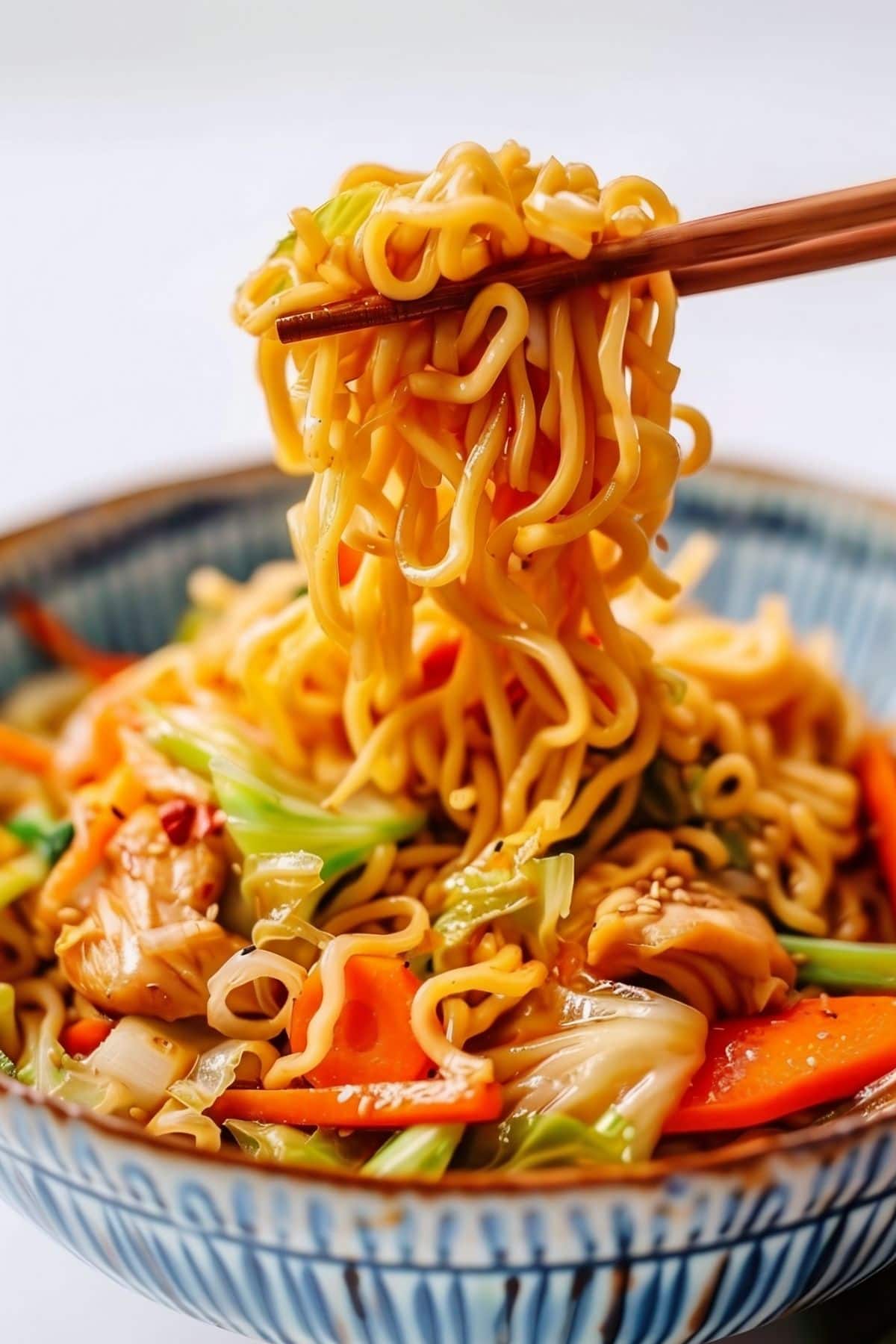
Is Yakisoba the Same as Ramen?
They’re both Japanese, but no, ramen and yakisoba noodles are not the same.
Ramen, perhaps the most popular type of noodles in Japan, are made of thin wheat noodles served in savory broths.
Yakisoba noodles, or chuka soba, are also made from wheat flour, but are thicker and starchier. Also, unlike ramen, chuka soba noodles are steamed and coated with oil.
While different, the two are very similar, which means you can use ramen noodles for this recipe if you can’t get ahold of soba.
Will Pre-Cooked Chicken Work in This Dish?
Absolutely. In fact, you can use whatever chicken you have available.
Whether it’s leftover baked chicken, rotisserie chicken, or fried chicken tenders, you can’t go wrong.
You can even use other meats and seafood, too! I’m talking turkey, pork belly, squid, and shrimp.
If you’re vegan, use tofu! It’s a great way to transform whatever’s left in the fridge into an awesome dish.
Just take note that if you’re using pre-cooked meat, mix it in towards the end.

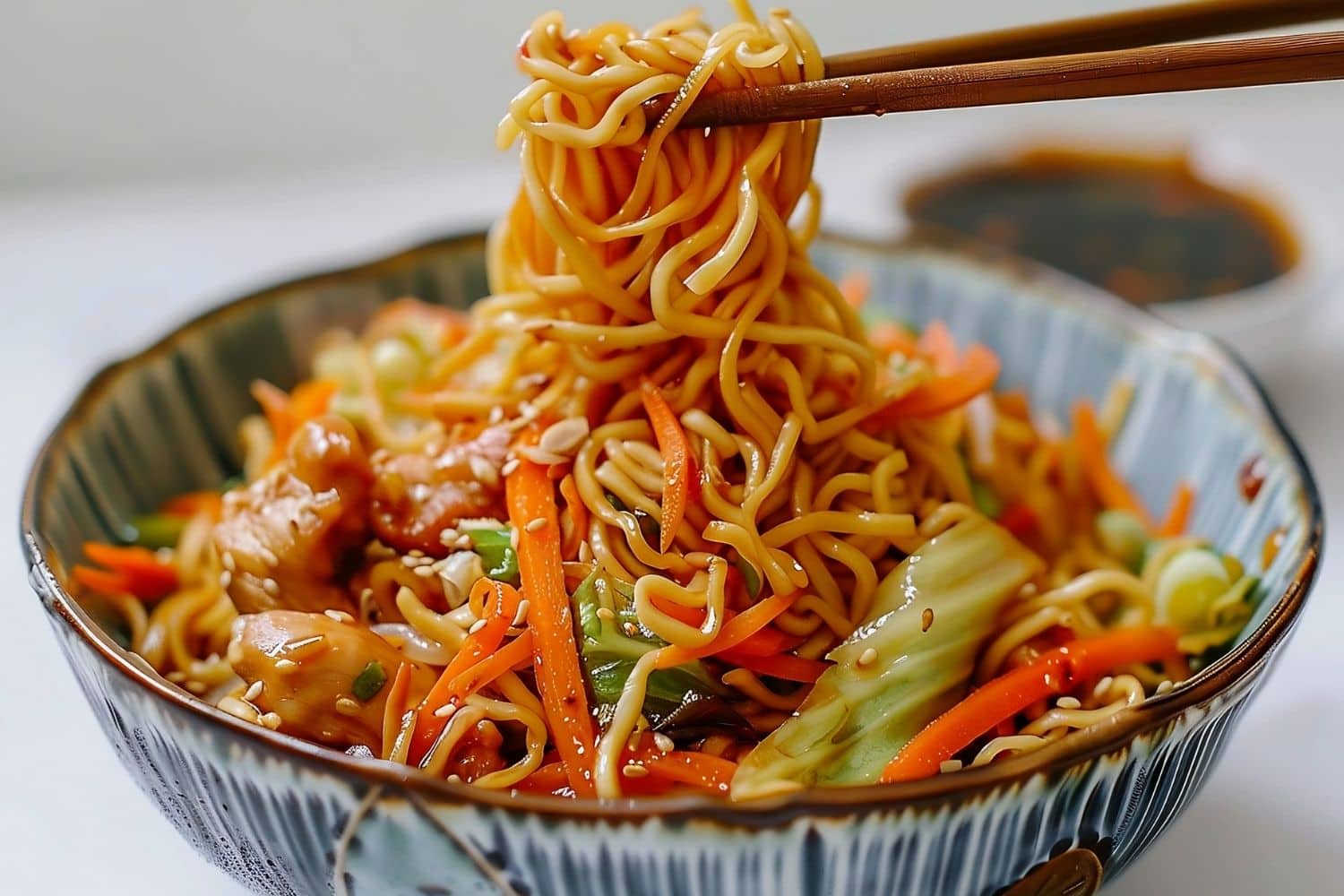

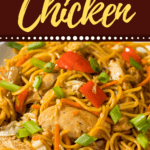
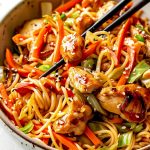
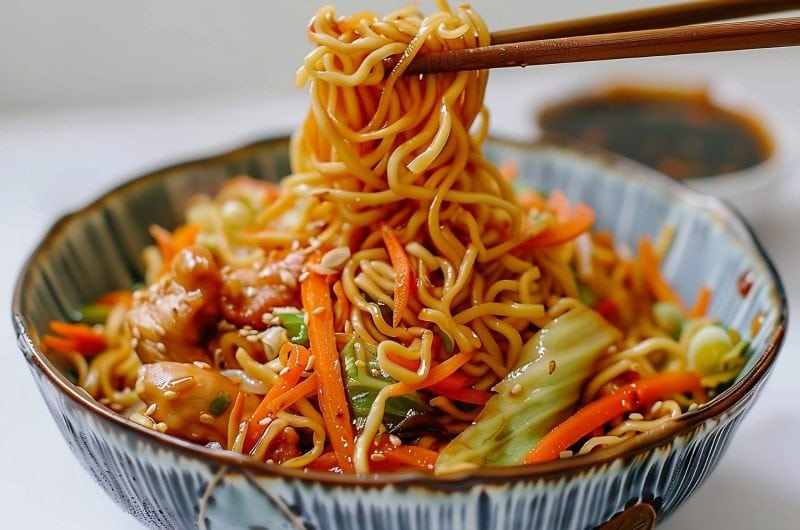
Loved it!!! super easy. I used the packed Cole slaw. I will be adding this to my rotation.
This recipe was a huge hit. The only issue I had was the noodles. I’ve never worked with these before and I tried the frying method as I was cooking the chicken. Epic fail.
The noodles got stiff and hard. I quickly boiled some water and threw them in for a few minutes. Much to my relief, they turned out fine. So, boiling from now on.
I used snow peas and onions, which was what I had on hand. It was called “incredible” and there was hardly any left.
Will definitely add to the monthly menu.
Quick thinking with the noodles, Lucinda! Glad you were able to boil them and not sacrifice the recipe! 🙂
How many cloves garlic does recipe call for? Can I leave out chili paste if allergic?
Hi, Leah! That was supposed to say 2 cloves of garlic. 🙂 I’ve adjusted the recipe, so thanks for catching that. As for the chili paste, yes, you can leave it out. It adds a little flavor, but the recipe won’t be hugely different without it. The biggest change you’ll notice is in the spice level. Chili paste adds heat, so you may want to add something extra to make it spicy if you enjoy the spiciness of the dish.